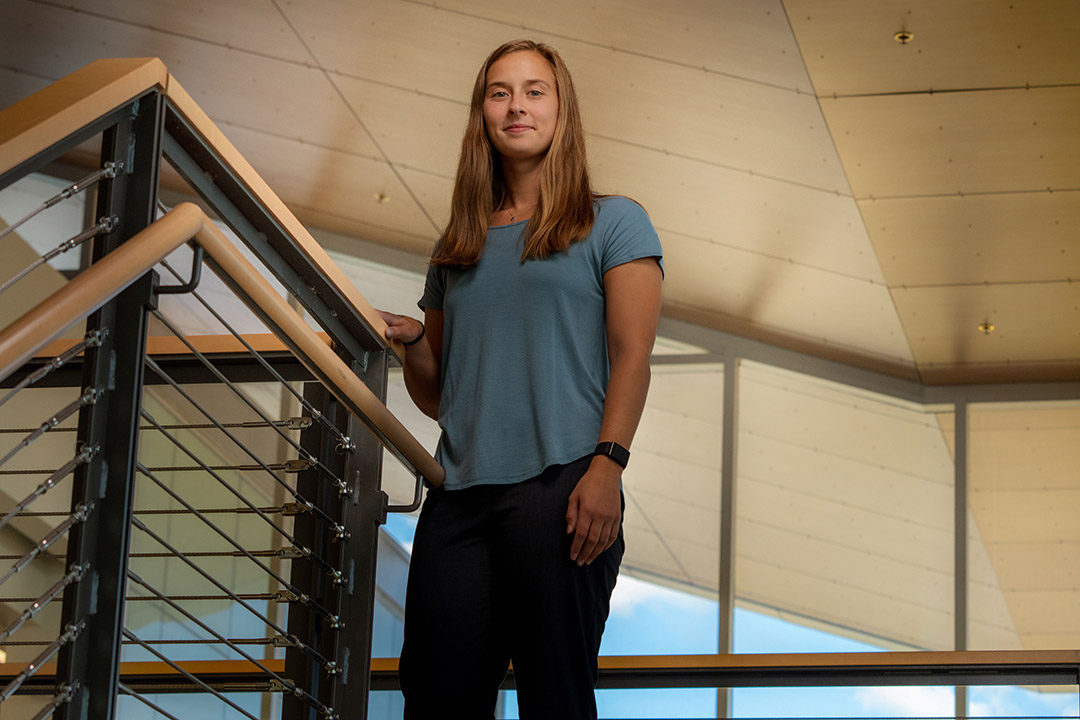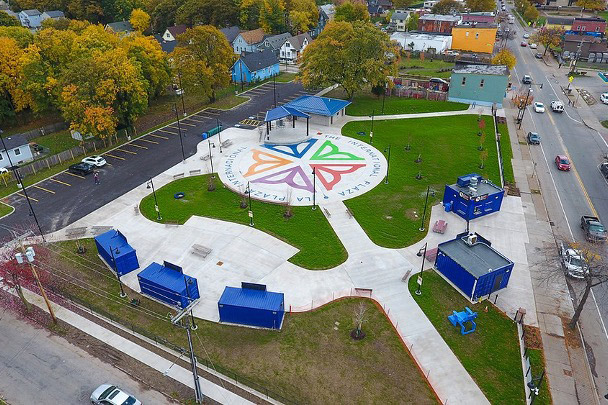Engineering Grand Challenges Scholars Program grows integrating community-based projects to balance technical skills
Student project recommendations implemented by the City of Rochester for one of its Northeast neighborhoods
Travis LaCoss
Jessica Wagner was one of the students who helped develop a traffic safety plan for the busy intersections around the International Market plaza in Northeast Rochester. She was part of RIT’s Engineering Grand Challenges Scholars program focusing on how multi-disciplinary teams can help solve 21st century problems.
Jessica Wagner and her classmates put together a plan to tame the traffic near Rochester’s International Plaza on Clinton Avenue. Data they collected and analyzed to improve traffic patterns around the busy intersection was presented this past spring to the Traffic Control Board of the Rochester City Council. Two of the recommended safety changes have already been made.
Rochester’s International Plaza on Clinton Avenue.
Students like Wagner, who are participating in RIT’s Engineering Grand Challenges Scholars program, are finding ways to integrate technical coursework with personal interests for careers that matter. Now in its fifth year, the program involves more students who pursue a wider mix of community-based projects like the one with the International Plaza and its community partner, the Ibero-American Development Corp. (IADC)
“This was different than any senior design project that I heard of before. They are often very technical, working on a product or with a company. But this one was with a local community,” said Wagner, who is from Millis, Mass. “It connected well with the Grand Challenges and the Rochester community, which was great, because I live here. I don’t know everything that goes on in the city, it is such a big city. Having an impact on one small neighborhood was really cool.”
In 2017, RIT became part of the Grand Challenges Scholars Program, a national initiative through the National Academy of Engineering (NAE) toward solving some of the major challenges of the 21st century. The NAE detailed 14 challenges that if solved through collaborations between individuals in science, engineering, and liberal arts could positively impact complex societal issues, such as improving urban infrastructure, or providing access to clean water and engineering better medicines.
RIT’s Grand Challenges Scholars Program, which started as a collaboration between Kate Gleason College of Engineering and the College of Liberal Arts, is a way for students to view issues as more than technical problems and to understand that solutions must integrate cultural, social, political, and human qualities.
The International Plaza project would touch on all of these.
As a central meeting place for the community in the Northeast Quadrant of Rochester, the International Plaza is open to vendors, entertainment groups, and service providers. Renovations and development plans for the plaza space have been led for several years by IADC, a nonprofit service organization advocating for the Latino community in Rochester.
Dawn Bird, IADC’s community engagement coordinator, worked closely with the students giving them a history of the community, the scope of the project, and making introductions to residents.
“We walked through the neighborhood together, letting residents know that the students were there as part of a project. They wanted residents involved,” said Bird. “They are experts in their own areas just like the students in theirs.”
They gathered information that would be added into a package for presentations at the Rochester City Council. While a next step is the formality of applying for permits, the foundational work is done.
Wagner, who graduated in May with a dual bachelor’s/master’s degree in industrial and systems engineering and sustainable engineering and will be starting a master’s program in sustainable systems at RIT’s Golisano Institute for Sustainability this fall, learned how her engineering skills need to be meshed with the social, business, entrepreneurial, and cultural competencies required to complete the program.
Students have several competencies they must meet, including completion of a specific academic discipline and experiences outside of the main academic discipline, which can be one of the many minors or immersions offered. A global aspect can be met through study abroad. Students must seek entrepreneurial/ experiences and often use connections to RIT’s Idea Lab and Simone Center initiatives. Social competencies can involve work with the community-engaged projects.
“It is up to the students for how they might want to take their Grand Challenges journey,” said Sarah Brownell, Grand Challenges program director and senior lecturer in RIT’s Kate Gleason College of Engineering. “It is based on their interests and if they have a specific challenge they are focusing on. How does your identity fit with your professional goals and how do you want to work your dreams and things you care about into your career? One of the ways we recruit students is we ask them, what is the story you want to tell around your whole undergraduate educational experience.”
Wagner saw the competencies as multidisciplinary and a way to provide some versatility in her career. She was expected to deliver technical solutions but she also had to consider the social impact that might occur.
“This program tied all those together,” she said. “It taught me a lot about how these skill sets are valuable in any career.”
RIT’s Grand Challenges Scholars Program, which started as a collaboration between the Kate Gleason College of Engineering and the College of Liberal Arts, now includes representation from the College of Engineering Technology, the College of Art and Design, and School of Individualized Study. The program continues this fall, and new students and faculty are being sought for community projects. Contact Sarah Brownell for more information.




